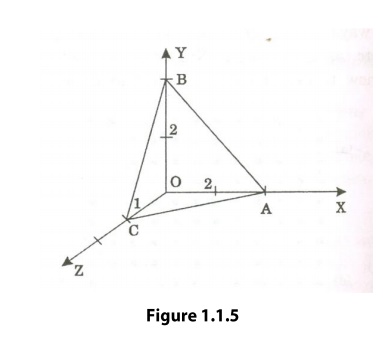Chapter: Physics : Crystal Physics
Miller Indices - Procedure for finding and Important Features
Miller Indices
Miller introduced a system to designate a
plane in a crystal. He introduced a set of three numbers to specify a plane a
plane in a crystal. This set of three numbers is known as Miller Indices of the
concerned plane.
Procedure for finding Miler Indices
· Determine the
intercepts of the plane along the axes X, Y and Z in terms of the Lattice
Constant a, b, c.
· Determine the
reciprocals of these numbers.
· Find the least common
denominator (LCD) and multiply each by this lcd. The result is written in the
form (hkl) and is called the Miller Indices of the plane.

Example
Let the plane have intercepts 4, 1 and 2 on
the three axes. The reciprocals are ¼ , 1 and ½. Multiplying each by 4, we get
1, 4 and 2. Hence (142) are the Miller Indices of the plane.
Plane ABC (figure 1.1.5) has intercepts of 2
axial units on X-axis, 2 axial units on Y-axis and 1 axial unit on Z-axis.
The reciprocals are ½,1/2 and 1. The LCM is 2.
Multiplying each by , we get 1,1,2. Hence the
Miller Indices of the plane are (112)
Important Features of Miller Indices
When a plane is parallel to any axis, the
intercept of the plane on that axis is infinity. Hence The Miller Indices for
that axis zero.
If a plane cuts an axis on the negative side
of the origin, corresponding index is negative.
The indices (hkl) do not define a particular
plane but a set of parallel planes. Thus the planes whose intercepts are 1, 1,
1;2, 2;-3,-3,-3 etc. are all represented by the same set of Miller Indices.
1 (a) Points to ponder
The Miller Indices should be enclosed only in
this bracket.
There should not be any commas in between the
numbers.
If the Miller Indices is say (2 6 3) means it
should be read as two six three, and not as two hundred and sixty three.
The direction of plane can be represented by
enclosing the Miller Indices in a square bracket. For example [2 6 3]
To represent the family of planes we can use
this bracket i.e. ->
Putting a bar over the numbers can represent
negative Miller Indices For an example (2 6 3) represents the plane with
intercepts on negative axis, positive Y-axis and negative Z-axis.
Related Topics